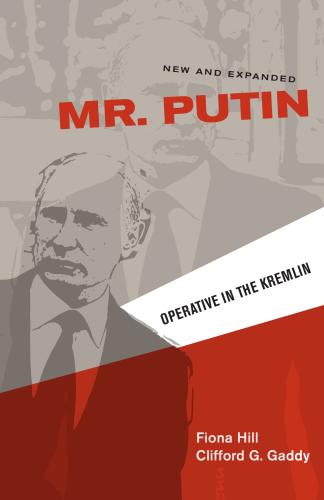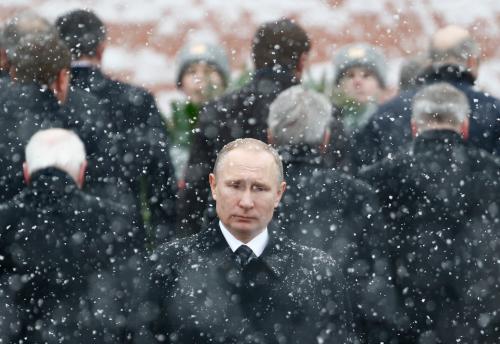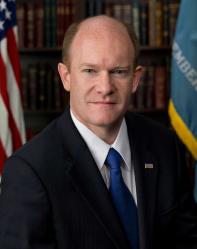At a Brookings event on April 6, Senator Chris Coons (D-Del.) spoke with Brookings President Strobe Talbott about whether we are headed for crisis with Russia. The following is the text of Sen. Coons’ opening remarks.
Strobe, thank you for your 15 years of leadership here at Brookings. This institution and the public policy conversations in Washington are stronger because of your long career in public service. I look forward to our discussion.
In 1950, a National Intelligence Estimate delivered to President Harry Truman outlined two goals of the Soviet Union. First, “destruction of working unity among the Western countries and thereby isolation of the United States.” Second, “alienating the Western people from their governments” to undermine the strength of the Western democracies.
Nearly 70 years later, the Cold War is over, communism is widely discredited, and the international arena has fundamentally changed. Yet the regime of Vladimir Putin is achieving today what the Soviet Union set out to do in 1950, as described in that memo. It is destroying unity in the West, isolating the United States, and alienating the Western people from our governments.
Today, I’ll discuss the campaign the Russian government is waging against the United States and our European allies. This is not a new Cold War—it is a new type of war, one that is undeclared and waged using unconventional tools.
This is not a new Cold War—it is a new type of war.
I am gravely concerned the United States is failing to see this challenge clearly and to respond effectively, and I think it’s important that I offer several specific suggestions for how Congress can take action.
Since World War II, the set of norms, alliances, and institutions that we know as the “American-led liberal international order” has helped preserve peace in Europe and stability around the world.
This order isn’t just good for the world—it’s good for the United States. It has allowed the American economy to grow. It has enabled democracy to spread. It has provided a framework for U.S. engagement and multilateral initiatives around the world. And it has strengthened fundamental democratic values like the rule of law, freedom of speech, freedom of the press, pluralism, and human rights.
We don’t fight for the liberal world order, for our allies, and for these values as an act of charity. A world committed to democracy and the rule of law is, I’m convinced, a more stable and prosperous world in which Americans are safer and more economically secure.
Vladimir Putin, however, does not support the liberal world order or the values that sustain it. He perceives it as fundamentally unfair to Russia and hostile to its interests.
Throughout Europe, Putin seeks to undermine the order through overt aggression—such as his armed interventions in Ukraine in 2014 and Georgia in 2008—and through other means, such as disinformation, subversion, and support for illiberal and authoritarian parties. Putin’s regime benefits directly from the election of European leaders who support narrow-minded nationalism and share its opposition to a cohesive European Union and a strong NATO.
But that’s not the Putin regime’s only goal. Through propaganda campaigns that spread misinformation, it also seeks to create a climate of confusion, doubt, and uncertainty to undermine trust in institutions and in the concept of democracy itself.
Russia knows it can’t compete with the United States or our European allies on a level playing field of free markets, democratic elections, and the rule of law. That’s why it is following a strategy based on a so-called “hybrid war” approach outlined in the “Gerasimov Doctrine,” a 2013 paper written by Valery Gerasimov, Chief of the General Staff of the Russian Armed Forces. His doctrine boldly proclaims that in the modern world the lines between war and peace are blurred and conflicts often are undeclared.
This doctrine says, and I quote, “The very ‘rules of war’ have changed. The role of nonmilitary means of achieving political and strategic goals has grown, and, in many cases, they have exceeded the power of weapons in their effectiveness.”
A key component of the Gerasimov approach is exploiting an enemy’s weaknesses. It argues, and I quote, “No matter what forces the enemy has, no matter how well-developed his forces and means of armed conflict may be, forms and methods for overcoming them can be found. He will always have vulnerabilities, and that means [that] adequate means of opposing him exist.”
Russia has enthusiastically—and, so far, somewhat successfully—employed the Gerasimov Doctrine by waging a covert and undeclared hybrid war on the West, using propaganda, economic statecraft, energy supplies, corruption, information warfare, and support for opposition parties.
This undeclared, but very real, “war” has already come to the United States. It has undermined Americans’ trust in our institutions, in each other, and in the very credibility of our democracy. War, as nineteenth-century Prussian strategist Carl Von Clausewitz said, is politics by other means. But this conflict is not limited to the United States. Today, the front in this war is European elections.
Across Europe, low levels of economic growth, rising income inequality, and a massive influx of refugees have sowed divisions and created conditions of instability and fear. This destabilized climate makes European nations particularly susceptible to Russian subversion that appeals to and inflames nationalism, xenophobia, and populism. Last August, I saw this reality firsthand during a bipartisan congressional delegation I led to the Czech Republic, Ukraine, and Estonia.
Putin continues to move aggressively to exploit Europe’s political vulnerabilities.
Putin continues to move aggressively to exploit Europe’s political vulnerabilities. As predicted in the January 2017 report by the U.S. intelligence community, the tactics employed in our own election are today on display in France, where Russia is actively supporting the presidential campaign of the National Front and seeking to undermine Emmanuel Macron, the surging independent candidate, through a series of fake stories created and distributed by Russian online “trolls” and propaganda networks like Russia Today, or RT, and Sputnik International. The Putin regime is employing similar tactics across Europe, from Germany and the Netherlands to Austria, Italy, and even the U.K.
The rise of far-right, authoritarian, anti-immigrant parties threatens the very existence of the European Union and America’s own well-being. Trade in goods and services between the U.S. and EU exceeds a trillion dollars a year, so any instability on the European continent can and likely will have a direct economic impact on the United States.
But the national security consequences of a weaker EU could be even more profound. A fragile European Union may revitalize national rivalries, sparking the type of division that could spell the end of sanctions against Russia for its illegal annexation of Crimea. Under this scenario, Russia would have free rein to expand its power, particularly in Eastern Europe, where Putin has his sights set on sovereign nations he believes are part of Russia’s sphere of influence, what it has long called the “near abroad.”
Make no mistake: the Putin regime has launched an undeclared war on the international order that has preserved peace and stability in the United States and Europe since World War II. In light of this challenge, let me suggest five concrete ways Congress must respond.
Make no mistake: the Putin regime has launched an undeclared war on the international order.
First, members of both political parties must understand the type of conflict in which we are engaged. To again paraphrase Clausewitz, we must first establish the kind of war on which our adversary has embarked.
I’ve heard many people say we’re in a “new” Cold War with Russia, but that’s false. As I mentioned earlier, the nature of our current competition with Russia is different from previous conflicts. That means that we cannot pursue the policy prescriptions of the past. If we only build up our traditional military capabilities and seek to contain Russia through force, without defending against its propaganda, cyberattacks, and information warfare, we will lose this conflict.
To successfully contain and respond to Russia, the understanding and buy-in of the American people are vital. According to a March 29th CBS News poll, only half of all Americans believe Russia actually interfered in our presidential election. Even more dangerously, perceptions of Russian influence in our election split along party lines. This is alarming, particularly after the entire U.S. intelligence community made it clear that Russia intervened in our electoral process. This profound and unsettling domestic division makes an effective and unified American response more difficult but also more urgent.
So, the first thing Congress must do is comprehend the nature of our conflict with Russia and ensure the American people share that understanding.
The second step Congress must take is to maintain sanctions against Russia. One bipartisan bill, the Counteracting Russian Hostilities Act, led by Democratic Senator Ben Cardin and Republican Senator John McCain, would authorize new sanctions against Russia for its aggression. The bill would also support civil society, pro-democracy, and anti-corruption activists in Russia and across Europe.
Another bipartisan bill, the Russia Review Act, introduced by Republican Senator Lindsey Graham, would require that Congress weigh in before President Trump could relax sanctions against Russia. Majority Leader McConnell should bring both bills to the Senate floor, where I believe they will pass with overwhelming bipartisan support.
The third step Congress must take is to provide support to our Eastern European partners by backing brave reformers in states like Ukraine and promoting economic development in countries like Georgia.
Moscow is attempting to export corruption to its neighbors to expand its influence. By helping our partners continue their fight to root out corruption, and by demonstrating that people in Eastern Europe are better off as a result of being able to do business with the European Union and the United States, we can mitigate Russia’s sway over these societies.
Fourth, all American elected officials should publically, privately, and repeatedly reassure our allies that the American people support NATO and the European Union, as well as increased U.S. troop rotations through Central and Eastern Europe.
This brings me to the final step Congress should take: fully fund programs that promote a more stable and prosperous world. As recent protests in Russia demonstrate, Vladimir Putin does not speak for all of the Russian people. But he has infiltrated and subverted Russian institutions to the extent that no one in Russia has the power to constrain him, even though many brave Russians continue to try. Only the United States and our allies can counter his aggressive aims.
That’s why, as a member of the Senate Appropriations committee, I am working with my colleagues to fund the European Reassurance Initiative to strengthen NATO, and to support existing USAID programs intended to bolster free and fair elections across Europe and to counter Russian influence. Our ongoing support for independent, objective journalism like the Broadcasting Board of Governors—specifically Radio Free Europe, Radio Liberty, and Voice of America—is vital to this effort. Another important step is the creation of a new fund that specifically targets the Russian government’s aggressive and subversive actions, which Senator Graham suggested at a recent Appropriations subcommittee hearing.
[I]t’s vital for the Congress to play a more constructive role in U.S. foreign policy.
Each of the five congressional actions I’ve outlined fits well within a bipartisan policymaking tradition of supporting our allies and punishing the Russian government when it breaks the rules or threatens our security.
Until Russia makes absolutely clear that it intends to act as a responsible, law-abiding nation, we must spare no effort to push back against its aggression to avoid the very scenario that you, Strobe, warned of in a recent New Yorker article: “a dog-eat-dog world with constant instability and conflict.”
In the 1950 memo to President Truman that I mentioned at the outset of this speech, the intelligence community wrote, “Moscow may be hoping…to frighten the West and reduce our will to resist.” Today, the European Union is faltering, Americans are fighting amongst ourselves, and Russia is interfering ever more brazenly in other nations’ affairs. If President Truman could see us today, he would demand that we summon the will to resist.
I’ve long said it’s vital for the Congress to play a more constructive role in U.S. foreign policy. Without meaningful leadership from the executive branch on the issues I discussed today, it’s even more critical that Congress do so. Thank you.
The Brookings Institution is committed to quality, independence, and impact.
We are supported by a diverse array of funders. In line with our values and policies, each Brookings publication represents the sole views of its author(s).







Commentary
Are we at war with Russia?
April 7, 2017